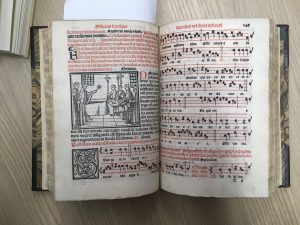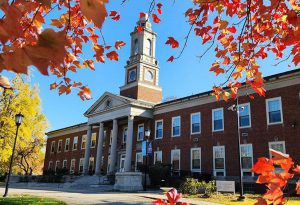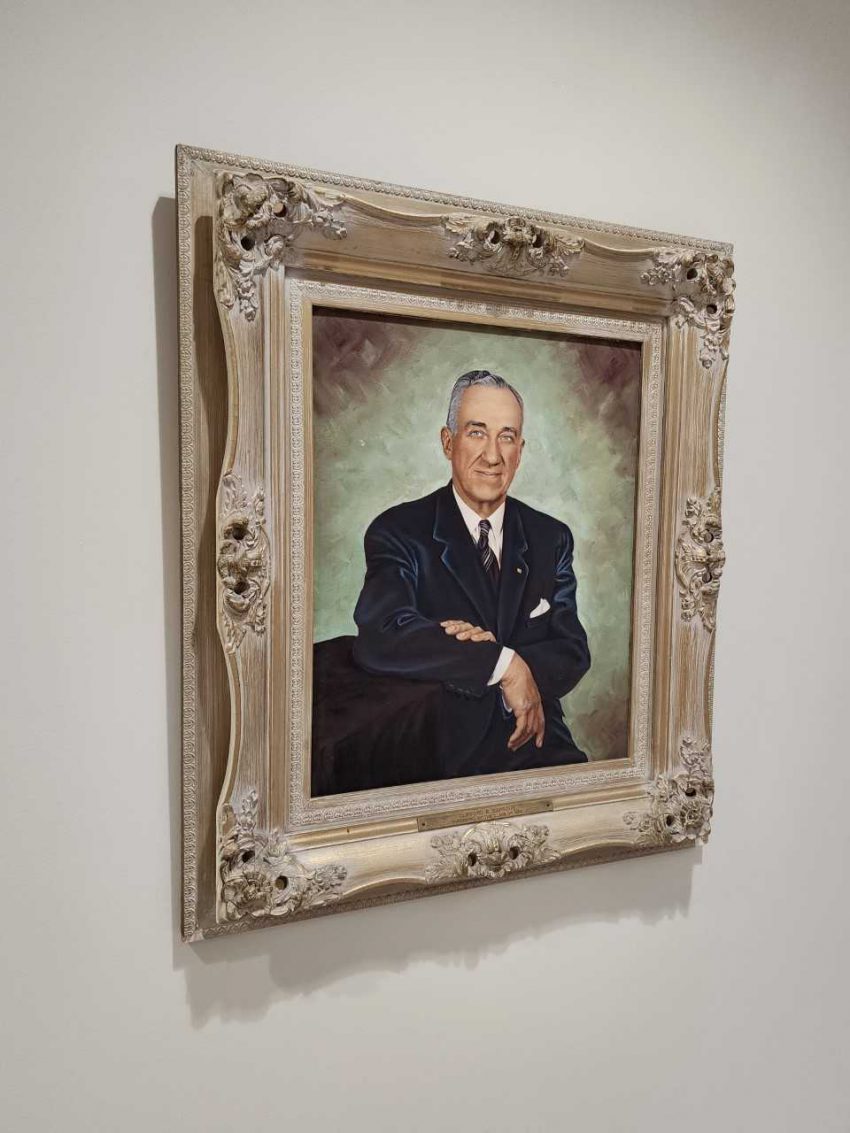This week, the Seminary celebrates the 60th anniversary of the Clifford E. Barbour Library (Sept. 21, 2024). Constructed in 1964 on the new campus of Pittsburgh Theological Seminary in the East Liberty neighborhood of Pittsburgh, Pa., the library building was named for Clifford E. Barbour, who became the first president of the newly consolidated Pittsburgh Seminary. Read on to learn more about the history of the Seminary, the library, and Barbour himself.
Join the PTS community in celebrating the library this week by stopping in any time to view a special display on the library’s history and on Thursday, Sept. 26 from 3:00-4:00 p.m. for a special 60th anniversary celebration in the Kelley-Orr Lounge. This event serves as the kickoff to our year of celebrating the anniversary!
– Sarah Betzig ’21, Communications Strategist at Pittsburgh Theological Seminary
Dr. Clifford (Cliff) E. Barbour and the formation of Pittsburgh Theological Seminary
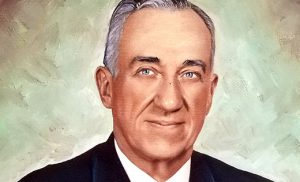
In 1958, Pittsburgh served as host for a monumental event in American Presbyterian history: the merger of the Presbyterian and United Presbyterian denominations to form the UPCUSA. With the differences between the two denominations rendered obsolete, questions arose as to the need for two separate seminaries a mere three blocks away from one another. In the year prior to the denominational merger, Dr. Clifford Edward Barbour, then president of Western Theological Seminary, begun discussion of a seminary consolidation with the Western board of directors and with his counterpart at Pittsburgh-Xenia Theological Seminary, Dr. Addison Leitch. The two presidents would together promote the idea of a seminary “consolidation” rather than a merger to evoke an atmosphere of unity.
Dr. Barbour went on to oversee the challenging consolidation process after Dr. Leitch stepped down, first as the new seminary’s vice president then as acting president until the 1961-1962 academic year, when he was elected president for his final year of service to the Seminary before retirement. Dr. Barbour remained an active member of the Presbyterian community until his passing in 1979.
A Pittsburgh native, Dr. Barbour was an alumnus of Western Seminary and of University of Edinburgh, Scotland, where he earned his Ph.D. in 1927. In addition to his service as president of Western Theological Seminary and of Pittsburgh Theological Seminary, Dr. Barbour was a pastor for many years at the Second Presbyterian Church of Knoxville, Tenn. (the congregation’s longest-tenured pastor, credited with beginning the church’s counseling program), dean of the School of Religion at the University of Tennessee, director of Maryville College, and moderator of the General Assembly of the Presbyterian Church in the U.S.A.
For further reading on Dr. Barbour, visit the biography page constructed for the library’s 50th anniversary celebration.
Dedication of the Clifford E. Barbour Library
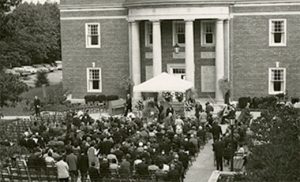
The Seminary’s library quickly outgrew its location in Long Hall, and plans for the construction of a new, three-story, brick building facing the school’s quad were made. The dedication was held Sept. 21, 1964, with Dr. Barbour in attendance. The keynote address was given by Dr. Martin Niemöller, a noted German Lutheran pastor who was a leader of the Confessional Church in Germany and was arrested and held prisoner for his part in Christian resistance during the Nazi era. He was also, at the time of this address, president of the World Council of Churches, a position he held from 1961 to 1968. More than 700 guests attended the dedication ceremony. To further mark the occasion, Dr. Markus Barth, son of Dr. Karl Barth of Basel, Switzerland, and PTS faculty member from 1963 to 1972, arranged to have his father’s desk and chair, as well as other objects, brought from Germany. He presented these treasures to the Seminary in 1964. Included with the gift of the desk at which Karl Barth wrote his theological works is an autographed copy of his Kirchliche Dogmatic I/1. The desk is presently on display in the Hansen Reading Room on the second floor of the library.
Listen to Dr. Clifford E. Barbour’s address at the 1964 library dedication.
Present Collections at the Barbour Library
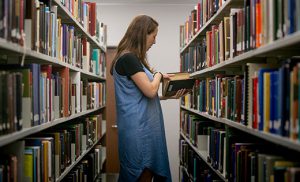 With almost 300,000 volumes, 88,000 micro forms, more than 800 periodical subscriptions, and a growing collection of electronic resources, the Clifford E. Barbour Library now contains the largest theological collection in the three-state region and is one of the largest stand-alone seminary libraries in the country. The library also houses archives and a variety of special collection materials.
With almost 300,000 volumes, 88,000 micro forms, more than 800 periodical subscriptions, and a growing collection of electronic resources, the Clifford E. Barbour Library now contains the largest theological collection in the three-state region and is one of the largest stand-alone seminary libraries in the country. The library also houses archives and a variety of special collection materials.
In 1826, the Rev. Joseph Kerr, first professor of theology of Allegheny Theological Seminary, purchased the first volumes for the school’s library with his own money. Then, in 1830 the Rev. Allen Ditchfield Campbell visited England and Scotland on behalf of Western Theological Seminary and acquired more than 2,000 volumes for that school’s collection. These initial purchases, along with gifts and purchases over the years, helped develop a historic collection particularly rich in Reformed theology, church history, and Bible. More recent collecting has emphasized an array of topics including global Christianity, ethics, and American religious history.
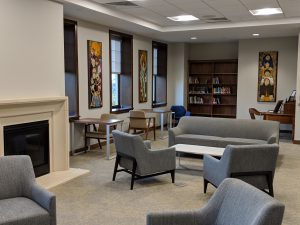
Completely renovated in 2018, the beautifully redesigned Barbour Library features 17 types of study spaces, including: group study rooms equipped with audio-visual capabilities and dry-erase marker friendly walls; a reference room featuring a range of theological dictionaries, commentaries, atlases, and other tools for exegetical study; an integrated learning space offering a variety of art supplies for tactile learning and creative expression; private class and conference rooms (ready for hybrid meetings); a recording and media room; a visiting scholar study carrel; an active learning space; a 24/7 area for students, faculty, and staff, featuring a computer lab, lounge, conference room, and grab-and-go café; and the Fred Rogers Family Room, featuring the library’s children’s collection, child-sized furniture, and a play theater in the theme of Mister Rogers’ Neighborhood. Ample natural light, technological compatibility, and historic and contemporary artwork are featured throughout.
To browse the Barbour Library’s catalog, visit https://www.pts.edu/barbour-library. To learn more about additional collections and artifacts at the library, including incunabula, biblical commentaries published during the time of the Protestant Reformation, ephemera preserving Pittsburgh-area church history, and excellently preserved hymnals dating as far back as the 16th century, read this post on the library’s archives: https://www.pts.edu/blog/national-library-week-2024/.
PTS Clergy Study Stays
PTS now invites clergy seeking time away for self-directed study to the Seminary’s campus through the new Clergy Study Stays program. Participants will have access to a private carrel (as available) in the Clifford E. Barbour Library, overnight accommodations on campus in Calian Hall, access to daily lunch service in Kadel Dining Room (as available), a library card and borrowing privileges (annual fee waived for program participants), and a welcome basket. Library staff remain available to aid visitors in utilizing the library’s resources.
Learn more about the Clergy Study Stays program or request a stay.
Read Next
